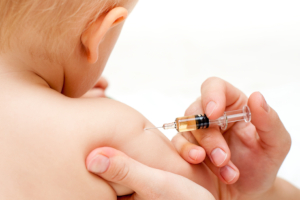Meningitis
The facts 
Meningitis is a serious and potentially fatal disease. However, if dealt with quickly meningitis can be treated successfully. While not terribly common, it is important to be aware of the disease so as you are able to recognise the signs and symptoms should someone in your family begin to develop them. Here, we answer all of your questions regarding the disease.
What is meningitis?
In some cases, however, the infection is able to pass through the membrane causing the meninges to become infected. The meninges swell as the body’s immune system responds in an attempt to stop the spread of infection. This swelling of the meninges may cause serious damage to the brain and nervous system. The bacteria that cause meningitis are common and live naturally in the back of the nose and throat. People of any age may carry the germs without becoming ill. In fact, usually these bacteria are beneficial to us as they help to build up a natural level of immunity to the disease. It is rare that these bacteria overcome the body’s natural defences and cause meningitis.
Are there different types of meningitis?
There are two different types of meningitis; viral meningitis and bacterial meningitis. Viral meningitis is the much more common, milder form of the infection. It can be treated at home in most cases, and is often mistaken for flu. Viral meningitis is most common among children in the summer time. Kids with viral meningitis usually recover well within 5-14 days.
Bacterial meningitis is much more severe than viral meningitis and can be fatal if not dealt with promptly. Bacterial meningitis requires immediate admission to hospital and intravenous antibiotics in order to treat the infection. Blood poisoning, severe brain damage and death can follow if left untreated. It is only possible to tell the difference between the two forms of meningitis through clinical tests. A doctor will carry out a physical examination, as well as blood test and a lumbar puncture. These tests will determine whether the infection is viral or bacterial.
What are the symptoms of Meningitis?
The symptoms of both types of meningitis are often identical. For this reason, if you suspect your child may have meningitis, it is important to seek immediate medical care. It is also important to be aware that not everyone suffering from bacterial meningitis will develop the well known rash so do not wait for this to appear. The symptoms of meningitis include:
#2 Nausea/Vomiting
#3 High temperature (over 38°C)
#4 Sensitivity to light
#5 Drowsiness/Confusion
#6 Seizures or fits
#7 Rapid breathing
#8 A distinct red rash that does not disappear when pressed with a glass
The symptoms of bacterial meningitis usually begin suddenly and rapidly get worse. There are however, a number of early warning signs to watch out for:
#2 Pale or blotchy skin
#3 Blue lips
#4 Unusually cold hands and feet
According to the HSE, the symptoms of bacterial meningitis are different in babies and young children, and include the following:
#2 Becoming irritable and not wanting to be held
#3 Unusual crying
#4 Vomiting and refusing feeds
#5 Pale and blotchy skin
#6 Loss of appetite
#7 Staring expression
#8 Very sleepy with reluctance to wake up
#9 Swelling in the soft part of the head
How is Meningitis treated?
If dealt with promptly, bacterial meningitis can be treated successfully. Bacterial meningitis is treated through intravenous antibiotics. If the IV antibiotics work well, patients may be in hospital for a week or less. However, severely ill patients may be in hospital for a few weeks or even months. In some cases, those suffering from bacterial meningitis may be transferred to an intensive care unit. Oxygen, IV fluids or steroids may also be given to help reduce swelling and treat the infection. Viral meningitis usually gets better without treatment. However plenty of rest, painkillers and anti sickness medicine may be taken to help with headaches, nausea and vomiting.
Are there vaccinations against Meningitis? 
Currently, there are vaccinations available and recommended in Ireland to fight against group C meningococcal bacteria. However, there is not yet a vaccination to protect against group B bacteria, of which most cases are caused by. According to the European Centres for Disease Control and Prevention Surveillance Report, Ireland has the highest rate of meningitis B notifications in Europe, with 89 cases in 2011.
For this reason, doctors have highlighted the need for new vaccination strategies. There are a number of vaccines available that will help to prevent many cases of bacterial meningitis. According to the HSE, they include:
- the measles, mumps and rubella (MMR) vaccination
- the meningitis C vaccination
- the meningitis B vaccination
- the 6-in-1 vaccine which provides protection against Haemophilus influenzae (Hib), diphtheria, whooping cough, tetanus, hepatitis B and polio
- The pneumococcal conjugate vaccine (PCV)
- The pneumococcal polysaccharide vaccine (PPV)
Children should receive all of the above vaccines as part of their vaccination programme. Contact your GP if you are unsure as to what vaccines your child has received. The meningitis C vaccination is given to children at four and six months of age, with a third dose at 13 months. For more information regarding the vaccine, click here. ACT for Meningitis is a charity which aims to raise awareness and educate society about the signs and symptoms of meningitis. Visit their website for more information.

No documents found